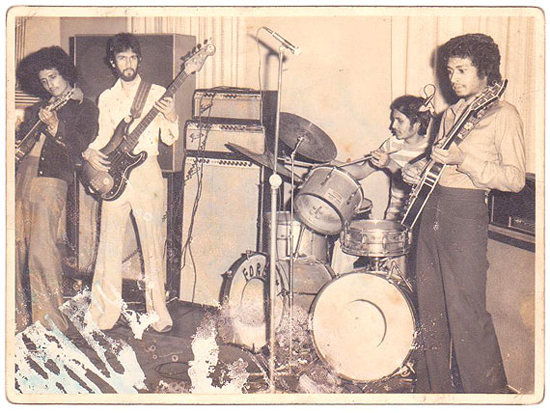In the late seventies India produced many thousands of Bollywood records but only one solitary psychedelic rock album. Or at least Obsession ’77 is alleged to be the only album of this venerable genre recorded in India. This is why avid record collectors in search of psych and freakbeat oddities have long paid over the odds for this album. In fact the curio had stirred so much interest that Now-Again Records felt compelled to dig deeper into the band’s history. The result of their excavations is Obsession – an anthology that draws from the album and a pool of unreleased studio and lives recordings.
The smoky, druggy, fuzz-laden sound is so evocative of a bygone era that it is almost impossible to extricate the music from band’s story. Part of the fascination lies in the fact that the album exists as the only relic of a tiny undocumented subculture. It vividly conjures hot sticky nights at Mumbai’s Slip-Disc and Blow Up nightclubs. The title track alone is a dense and muggy instrumental laced with intoxication. It alludes to a counterculture far removed from Mumbai’s conservative mainstream.
And the band’s odd biography has only served to add mystique to their outsider sound. Atomic Forest’s founding member – guitarist Keith Kanga – lost both his parents at an early age and was brought up in a brothel by his grandmother. The band rehearsed in Kanga’s house and their equipment – which included Marshall Amps, knock-off Rickenbackers and even a theremin – was financed by his grandmother’s illicit business. The line-up changed several times and eventually the band disintegrated in the wake of substance abuse and tensions surrounding money. However, in the time that they existed, apart from recording India’s only psychedelic rock album, they jammed with Led Zeppelin and performed at the Snehayatra Festival ‘The Indian Woodstock’
Now-Again Records tracked down frontman Madooo who now lives in New York. The Quietus spoke to him about some of the experiences that shaped their sound.
When and where were you born? Can you tell me a little about growing up in India at that time? Was it a conservative culture?
Madhukar Dhas: I was born in Madras [now Chennai] October 25th, 1949. Most of the early years were spent in boarding schools because my dad was moved from state to state as a sales manager. I was a loner and had about half a dozen friends through high school. My dad wanted me to learn the violin. I hated it because kids used to make fun of me carrying the violin case on the way to classes. The guitar always fascinated me. No matter how persistent I was in my requests, dad never bought me a guitar. When I was in Grade 8, I started listening to popular music. The only source was a local station that played Elvis, Ricky Nelson, Cliff Richard, Pat Boone and groups like Herman’s Hermits, Peter & Gordon etc. The program was called Listener’s Choice; it lasted for an hour every Saturday night. It was broadcast after 10pm, which was after our curfew time. I used to sneak up to another room where a friend owned a tiny radio. I had to listen to the music with my ears glued to the tiny 2" speaker because the music had to be played at the lowest volume. I would have been punished for breaking the rules.
Pocket money was around a couple of rupees a week. I saved enough to buy my first vinyl EP Twist and Shout by The Beatles. The school hostel only had one dinky record player, also with a 2" speaker. Kids had to line up to have their choice of one song played. Music time was only an hour on Sunday evenings. I remember standing in line to hear my Beatles record. The other kids in front of me only listened to Bollywood style music in their local languages. When my turn came, I couldn’t believe my ears. I freaked out when I heard ‘Twist and Shout’. The other kids knocked the needle off the record laughing at me but from that moment on I was obsessed by UK music. I had a little book in which I would paste any kind of pictures I could find of The Beatles, The Stones etc.
In high school, Sukumar Nambiar, the son of a famous actor – M.N.Nambiar, befriended me because of our common musical interests. He used to fill me in on news from the UK and tell about what was popular there. Together we moved to study at the Madras Christian College. It was there that I first saw an electric guitar and I was completely mesmerized. It became a fever. Another friend and I used to break college rules and slip out of the bars on our room windows. We would stay up late listening to a band called The Mustangs rehearse in the auditorium and we attended their concerts. They were an instrumental band and they covered songs by The Ventures and The Shadows. A few other bands began to bloom in other colleges, but none with much on the vocal front. It then dawned on us that we should start one. Sukumar had the money to buy the equipment and the place to rehearse in his father’s home. Suku’s younger brother Mohan was the drummer, and The Voodoos were born.
It was a very conservative culture and hence more of a challenge for us to get it together. Suku’s Dad was open-minded – my father was not. I recall my dad used to force me to come out and sing ‘Satisfaction’. He would make all the guests ridicule me and laugh at me. He’d say, "This is what he calls music."
Your family expected you to become a doctor but you chose the path of artist and musician. Was it hard to go against your family’s expectations?
MD: Yes. We were programmed to become what our parents wanted us to be. Doctors, engineers and accountants were reputable professions. I was the second of four brothers, sort of neglected and abused. My Dad would say to all his visiting guests, “My first son is going to be an engineer, my third son an accountant but my second son… I don’t know… he wants to be on the roadside and paint billboards or maybe sing in some restaurants where respectable people are dining."
Can you tell me a bit about [your first band] The Voodoos?
MD: Suku was the frontman. I played the lead guitar and did harmonies. Bass players changed constantly because we could not get anyone committed enough. The last one was Patrice Dedeyn, a kid from France. Rehearsals were especially hard for me, because my Dad lived about twenty miles away from Suku’s home. I was not given pocket expenses, so I had to ride on a rickety bicycle through the Madras heat to Suku’s home, sometimes to be told he wasn’t home and I would have to cycle all the way back.
We only got to play at local venues. More bands began to surface. A tobacco company called Simla Cigarettes started to cash in on the uprising bands and started annual Simla Beat contests. They would make the money. The winners would get a very small prize. The Voodoos were getting popular because of our appearance and showmanship. We dressed in uniforms, very flashy clothes. Suku would take us to the textile shops and buy loud coloured cloth from Bombay Dyeing, most of them were meant for curtains. We were set to play at the home of a famous film star. When we made our appearance we noticed that the curtains were the exact same material as our shirts. We headed out the backdoor and never played the gig.
The bands were highly competitive and never mingled. In fact the contests started getting ugly. Rival bands would get their fans to boo and throw rotten eggs and vegetables when the competition came on to perform. I remember trying to duck the eggs. Some of us tried to stand in front of the speakers and equipment to avoid them getting hit, because we could not afford another amp or speaker, some of which were rented.
I wish I still had my first guitar. It was a very poor imitation of a Rickenbacker with the two horns, crafted by the only man who made electric guitars in Madras at Violin Crafts. It took six months to make. I gave it for repainting when I started my life in Mumbai. I could not afford the charges and the paint shop never gave it back to me.
I would say that we were also a psychedelic rock band. The Voodoos ceased to exist when our college days ended and my Dad had moved to Pune in Northern India.
One of our last shows was at an all Woman College. Suku got cold feet because he had never been in front of so many women at one time. I was angry and unwilling to turn the opportunity down. Firstly, it was a heaven sent venue and secondly, the date was set. Who would sing? I would and I could. That was the freaked out experience that made me want to become the lead vocalist who later on went on to Bombay [Mumbai] to front Atomic Forest.
I am very grateful to Sukumar Nambiar for giving me the opportunity because otherwise I would not have known about any music from the UK and the USA. He was the only one I knew who would get all the latest imports. We covered The Troggs, The Turtles, The Kinks, The Stones, The Beatles, The Electric Prunes, The Doors, to name a few. I took those influences along with me to Atomic Forest.
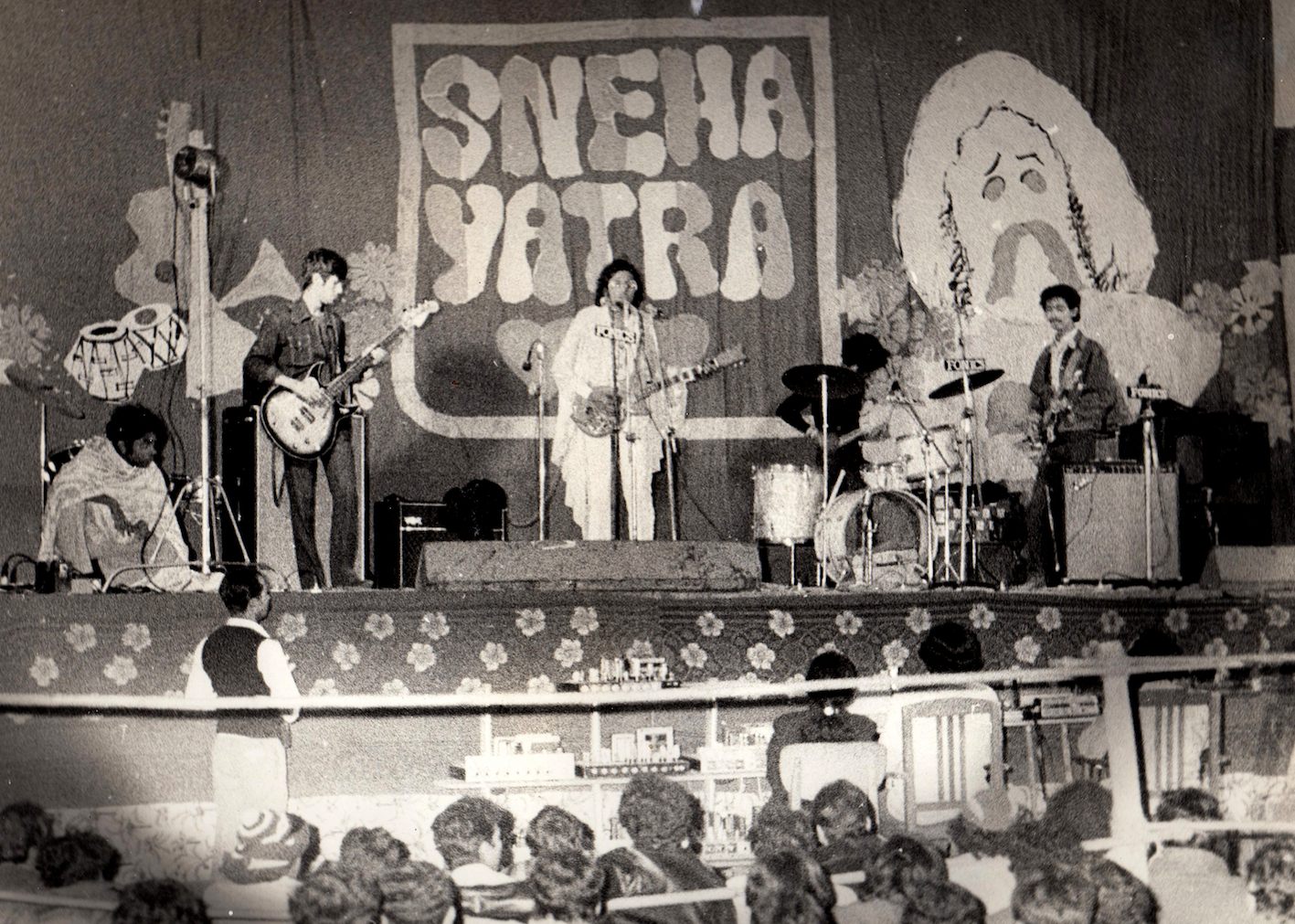
Were you a member of Atomic Forest when the band played The Snehayatra Festival ‘The Indian Woodstock’ in Malavli? Can you tell us a bit about the festival?
MD: Yes. We were then at the peak of our popularity. Basically, a college professor out of Mumbai – a serious stoner – decided he would do this very discreetly and planned it very well avoiding all police intelligence.
Atomic Forest played at 1am on the second night. The band was given a shack. We were so tired and passed out. When we awoke, there were quite a few girls sleeping between us all. All I remember saying was to the girls on either side of me, "I didn’t know you were here" that was my excuse for not being able to perform in bed, perhaps. I had to be back by 9am in Bombay [Mumbai] at my advertising job and there was also the commitment to the Slip-Disc Club to perform that evening.
It was a pseudo-psychedelic scene. Everyone was dressed in clothes similar to the real Woodstock, faking it with "Peace" signs and smoking up as much as they could. The Pune Mountains are very cold and I was half frozen until I got on stage with Atomic Forest. The adrenaline rush brought back all the fire. It was a very memorable performance for those who could remember it. Freddy Manricks was then Atomic Forest’s lead guitarist and we were influenced by The Allman Brothers. I recall covering ‘Whipping Post’ and ‘One Way Out’.
What was your relationship with Keith Kanga like? The band’s line up changed several times. What was he like to work with?
MD: Keith was a lovable human being. All love, but curiously a very sharp businessman. He had a very bad childhood, having lost both parents at a very early age. His only mentor was his grandmother.
We rarely got paid because he’d blow all the money. In the early days I never gave it a thought because I enjoyed being in Atomic Forest but in later years got weary of it. I produced a two-hour rock review called The Evolution of Mr. Rock. In it we took the audience through a visual and musical journey. It started with me coming down the aisle as a beggar with a cup in my hand, singing ‘You Are My Sunshine’ and as I walked into the curtains Atomic Forest opened up unbelievably loudly with all the lights and effects. The show closed with ‘Travel On’ which is on Eothen’s album.
After two days of full house performances, Keith said there was no money. I asked why. He said they all ate chocolates. There was his drugged up answer.
The last time I saw Keith was when I was on transit to the Blue Mountains in Mysore State. Atomic Forest was playing at a club that I went to with my wife Sophia. He first requested and then demanded I get up on stage and sing with them. I was on vacation. I refused. We got in an argument. He claimed he ‘made’ me. I was furious and threatened to strike him. I left after a couple of drinks. When I left, I saw Keith sitting on the sidewalk as I got into a car, "Man I’m shoo shooorry."
I did not answer. I regret that moment. And that’s the last I saw of him. I wish I had said something positive. Later after coming to the USA, he appealed to me for a donation claiming he was running a rehab clinic in New-Delhi but I did not respond because I heard he was using it as a cover-up to support his own drug habit.
Keith’s grandmother sounds like an intriguing character. I read in the Obsession sleevenotes that she read Rolling Stone magazine and operated a brothel from her home. Not typical granny pursuits. Do you know anything about her life before you met her?
MD: No one had a groovier grandma ever. She would take care of "Keith Baba", as she called him, through thick and thin. She slept on a king size filthy dirty bed with Foofoo her dog and Keith on the other side of Foofoo. Granna cooked for all and never refused a request for a meal from the band. She was a great chef. We never saw the kitchen. Now I think it might have been in the whorehouse premises.
She would never refuse Keith any request for buying equipment. A man called Hanif, rented the rest of Keith’s home. One day Keith threw a tantrum about wanting to buy a Marshall amp speaker. Hanif was over with a huge roll of hundred rupee bills that Granna could not hide from me. She tried to hide it behind her, but I saw it. The next day, Keith had his Marshall amp and speaker stack.
I remember seeing Granna lying sunken on her dirty bed reading Rolling Stone with a magnifying glass. One time she advised me, "Madhu, you must do showmanship like Tom Jones.” and she said, "You can do one cartwheel or maybe two."
The only time Granna came out to see Atomic Forest was at the first night of Evolution Of Mr. Rock. Her hair was all done up and in a net. She wore a red lipstick with rouge and all.
I’d love to know more about the Mumbai nightclub scene. Tell us some tales from your days at the Slip-Disc and Blow Up. Led Zeppelin visited Slip-Disc. Did you jam with them?
MD: Slip-Disc was a very small venue, about thirty feet deep by eighteen feet wide. No tables, nothing. The ceiling height might have been about fourteen feet maybe. I used to climb on the speakers, touch the ceiling and jump off the top of them. The atmosphere was always very dark with psychedelic lava lamps, strobes and UV lights. The ideal place for teenagers to come in and neck as much as they wanted without being recognized.
I was at Slip-Disc one evening, just hanging out. I was not on contract to perform there. It was nothing out of the ordinary until three gentlemen walked in. Some of their faces seemed unbelievably familiar. It was Robert Plant and Jimmy Page and another guy who I later learnt was Richard Cole.
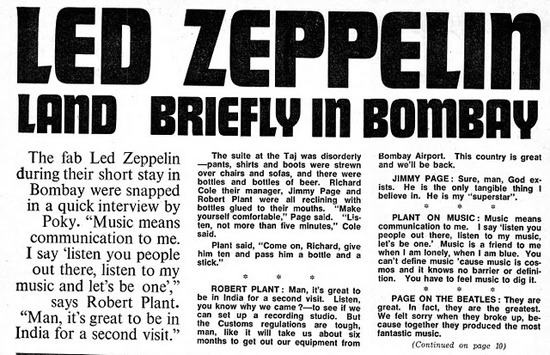
Ramzan [owner of Slip-Disc] was one of the shrewdest businessmen I knew. But he had no clue who Led Zep were. I can recall him snapping his fingers at Jimmy and calling him Plant. "Come on Plant, Plant, Plant, have another drink.” The beer was pretty bad. It was called "Bombay Beer", when you opened a bottle it had no head. It looked more like soap bubbles. Nevertheless Plant and Page had quite a few and got tipsy.
I was commanded by Ramzan to go and talk to them. My feet were colder than ice but I did it. I looked like a total geek. I was introduced to Plant as India’s No. 1 rock singer. Plant asked me. "What kind of music do you do?" And I went,"Hummana… hummanaa… hummanaaa… we try to copy you." Clearly Plant was not impressed. His next question to me was, "Where are the chicks man?" I promised that a few would show.
Ramzan’s next command to me was, "Sing."
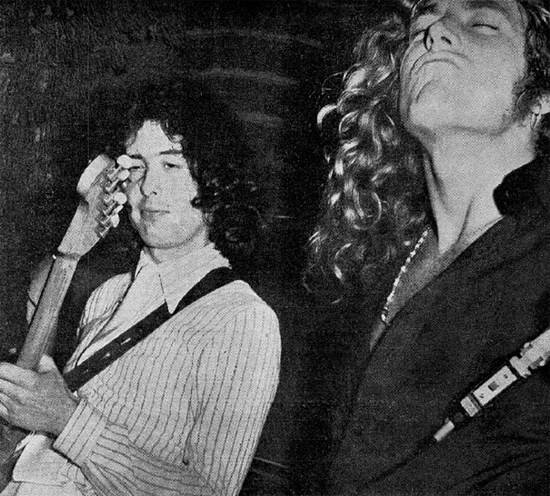
Not being under contract, and also with such cold feet, I refused. He dug his fingers into my left ribs, commanding me, "Go sing, you bastard!" And I did. I sang ‘Honky Tonk Women’. Robert Plant was sittings about ten feet away from me. When I was done, he gave me a thumbs-up. That image is forever etched in my mind and perhaps why I will never stop singing.
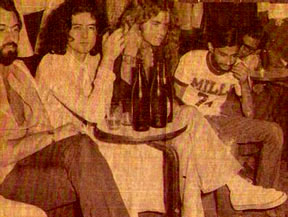
The evening ended weirdly. I think Plant and Page had quite a bit of booze. This also ended my ‘hero-worshipping’ them. They went upstairs to a whore-joint where then you could get a dozen women for a few bucks. I waited outside for a few hours. Richard was talking to me. I was asking him if they would ever consider playing in India. His answer to me was, "Fuck man, the Government of India cannot afford us." I felt let down and went home because I also had to be at work at my advertising job in four hours.
The next night Rumzan capitalized on the incident. Slip-Disc was packed to capacity and beyond. Plant and Page had promised to show and eventually did but I think they were hugely disappointed. The first night was so tranquil and innocent. The second night was a fiasco. Girls were trying to sit next to them. I remember Plant shoving a few off his row. Plant threw a glass of beer into a photographer’s camera and both of them left in a huff.
Nowadays many people choose a career in music for the fame and glory. You kept making music in spite of the fact that the scene was tiny and you made no money. It seems to me that Atomic Forest’s were destined to exist as a symbol of Indian counterculture. How do you feel about the renewed interest in the band? Why do you think it is important that Atomic Forest’s legacy lives on?
MD: I am so proud of my history as one of the founding members of Atomic Forest.
I wish every success to Eothen [Alapatt- who produced the compilation] at Now-Again, a sort of a saviour in my life who has re-ignited the fire, to continue my musical journey.
Obsession is out now on Now-Again Records

